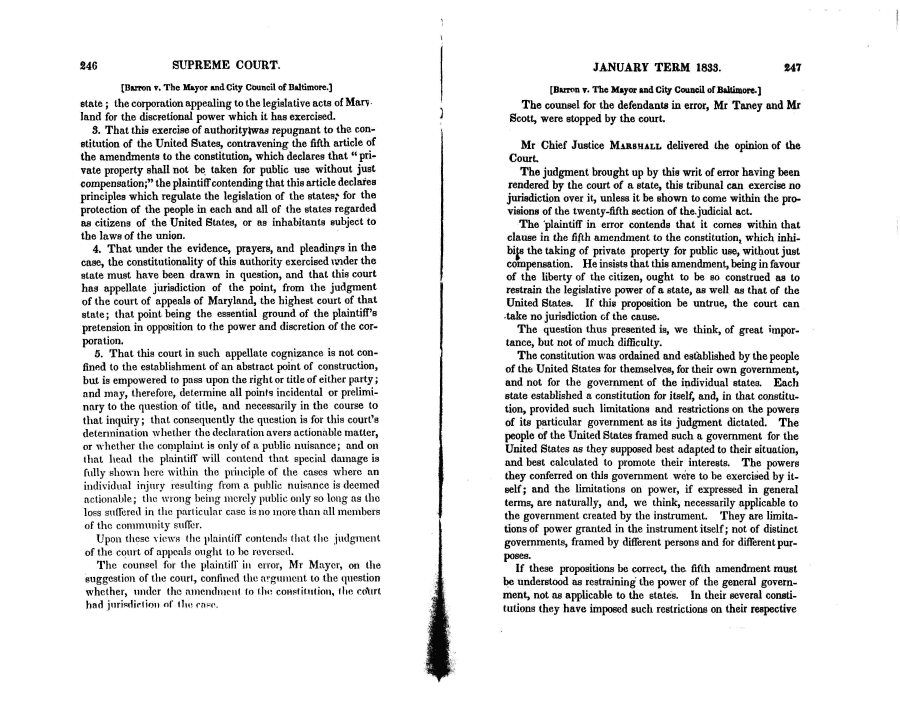|
246
SUPREME COURT.
[Barren v. The Mayor and City Council of Baltimore.]
state; the corporation appealing to the legislative acts of Marv
land for the discretional power which it has exercised.
3. That this exercise of authoritylwaa repugnant to the con-
stitution of the United States, contravening the fifth article of
the amendments to the constitution, which declares that " pri-
vate property shall not be taken for public use without just
compensation;" the plaintiff contending that this article declares
principles which regulate the legislation of the states," for the
protection of the people in each and all of the states regarded
as citizens of the United States, or as inhabitants subject to
the laws of the union.
4. That under the evidence, prayers, and pleading's in the
case, the constitutionality of this authority exercised under the
state must have been drawn in question, and that this court
has appellate jurisdiction of the point, from the judgment
of the court of appeals of Maryland, the highest court of that
state; that point being the essential ground of the plaintiff's
pretension in opposition to the power and discretion of the cor-
poration.
5. That this court in such appellate cognizance is not con-
fined to the establishment of an abstract point of construction,
but is empowered to pass upon the right or title of either party;
and may, therefore, determine all points incidental or prelimi-
nary to the question of title, and necessarily in the course to
that inquiry; that consequently the question is for this court's
determination whether the declaration avers actionable matter,
or whether the complaint is only of a public nuisance; and on
that head the plaintiff will contend that special damage is
fully shown here within the principle of the cases where an
individual injury resulting from a public nuisance is deemed
actionable; the wrong being merely public only so long as the
loss suffered in the particular case is no more than all members
of the community suffer.
Upon these views the plaintiff contends that the judgment
of the court of appeals ought to be reversed.
The counsel for the plaintiff in error, Mr Mayor, on the
suggestion of the court, confined the argument to the question
whether, under the amendment to the constitution, the co\irt.
had jurisdiction of llu» rase.
JANUARY TERM 1833.
247
[Barren v. The Mayor and City Council of Baltimore.]
The counsel for the defendants in error, Mr Taney and Mr
Scott, were stopped by the court.
Mr Chief Justice MARSHALL delivered the opinion of the
Court.
The judgment brought up by this writ of error having been
rendered by the court of a state, this tribunal can exercise no
jurisdiction over it, unless it be shown to come within the pro-
visions of the twenty-fifth section of the. judicial act.
The 'plaintiff in error contends that it comes within that
clause in the fifth amendment to the constitution, which inhi-
bits the taking of private property for public use, without just
compensation. He insists that this amendment, being in favour
of the liberty of the citizen, ought to be so construed as to
restrain the legislative power of a state, as well as that of the
United States. If this proposition be untrue, the court can
•take no jurisdiction of the cause.
The question thus presented is, we think, of great impor-
tance, but not of much difficulty.
The constitution was ordained and established by the people
of the United States for themselves, for their own government,
and not for the government of the individual states. Each
state established a constitution for itself, and, in that constitu-
tion, provided such limitations and restrictions on the powers
of its particular government as its judgment dictated. The
people of the United States framed such a government for the
United States as they supposed best adapted to their situation,
and best calculated to promote their interests. The powers
they conferred on this government were to be exercised by it-
self; and the limitations on power, if expressed in general
terms, are naturally, and, we think, necessarily applicable to
the government created by the instrument. They are limita-
tions of power granted in the instrument itself; not of distinct
governments, framed by different persons and for different pur-
poses.
If these propositions be correct, the fifth amendment must
be understood as restraining the power of the general govern-
ment, not as applicable to the states. In their several consti-
tutions they have imposed such restrictions on their respective
|

